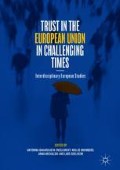Abstract
Bakardijeva Engelbrekt, Bremberg, Michalski, and Oxelheim introduce the concept of trust in the European Union by pointing out its elusive character comprising both interpersonal relations and attitudes towards organizations and broad-based institutions in society. In the early days of integration, trust was primarily connected to the European security community. Then, trust was present mainly among political, economic, and bureaucratic elites while public confidence in European integration took a vaguer form. Today, trust in the EU is challenged by numerous developments, ranging from the deteriorating internal and external security situation and terrorism to rising populism and anti-establishment sentiments. Also, rapid change in the digitalization of society and changing conditions for socio-economic development play a decisive role in the evolution of trust in Europe.
Access this chapter
Tax calculation will be finalised at checkout
Purchases are for personal use only
Notes
- 1.
The academic literature on social and political trust is vast and it spans several fields ranging from sociology, economics, political science, and psychology; see, inter alia, Easton (1965), Norris (1999), Mishler and Roses (2001), Tinggaard Svendsen and Lind Haase Svendsen (2009), Algan and Cahuc (2010), and Schlössers, Fetchenhauers and Dunning (2016).
- 2.
For a comprehensive historical overview of European integration, see Urwin (2014).
- 3.
References
Abts, K., Heerwegh, D., & Swyngedouw, M. (2009). Sources of euroscepticism: Utilitarian interest, social distrust, national identity and institutional distrust. World Political Science Review, 5(1), 1–26.
Adler, E., & Barnett, M. (1998). Security communities. Cambridge: Cambridge University Press.
Algan, Y., & Cahuc, P. (2010). Inherited trust and growth. American Economic Review, 100(5), 2060–2092.
Bickerton, C. (2015, July 9). The real sins of Varoufakis. Le Monde Diplomatique. Retrieved from http://mondediplo.com/outsidein/the-real-sins-of-varoufakis
Bremberg, N. (2018). The EU and the European security community: History and current challenges. In A. Bakardijeva Engelbrekt, A. Michalski, N. Nilsson, & L. Oxelheim (Eds.), The European Union: Facing the challenge of multiple security threats. Cheltenham: Edward Elgar.
Checkel, J., & Katzenstein, P. (Eds.). (2009). European identity. Cambridge: Cambridge University Press.
Deutsch, K., Burrell, S., Kann, R., Lee, M., Lichterman, M., Lindgren, R., et al. (1957). Political community and the North Atlantic area: International organization in the light of historical experience. Princeton, NJ: Princeton University Press.
Easton, D. (1965). A systems analysis of political life. Chicago, IL: University of Chicago Press.
European Commission. (2015, May 13). A European agenda on migration, COM(2015) 240 final, Brussels. Retrieved from https://ec.europa.eu/homeaffairs/sites/homeaffairs/files/what-we-do/policies/european-agenda-migration/backgroundinformation/docs/communication_on_the_european_agenda_on_migration_en.pdf
Favell, A. (2011). Eurostars and Eurocities: Free movement and mobility in an integrating Europe. John Wiley & Sons.
Fligstein, N. (2008). Euroclash: The EU, European identity, and the future of Europe. Oxford: Oxford University Press.
Haas, E. (1958). The uniting of Europe: Political, economic, and social forces, 1950–1957. Stanford, CA: Stanford University Press.
Haas, P. (1992). Introduction: Epistemic communities and international policy coordination. International Organization, 46(1), 1–35.
Harteveld, E., Meer, T. V. D., & Vries, C. E. D. (2013). In Europe we trust? Exploring three logics of trust in the European Union. European Union Politics, 14(4), 542–565.
Hobolt, S. B., & Tilley, J. (2016). Fleeing the centre: The rise of challenger parties in the aftermath of the euro crisis. West European Politics, 39(5), 971–991.
Hooghe, L., & Marks, G. (2009). A postfunctionalist theory of European integration: From permissive consensus to constraining dissensus. British Journal of Political Science, 39(1), 1–23.
Juncker, J. C. (2016, September 14). Speech on the State of the Union, Strasbourg. Retrieved from https://ec.europa.eu/commission/state-union-2016_en
Kaelble, H. (2009). Identification with Europe and politicization of the EU since the 1980s. In J. Checkel & P. Katzenstein (Eds.), European identity. Cambridge: Cambridge University Press.
Kriesi, H. (2014). The populist challenge. West European Politics, 37(2), 361–378.
Lewis, J. (2005). The Janus face of Brussels: Socialization and everyday decision making in the European Union. International Organization, 59(4), 937–971.
Milward, A. (1992). The European rescue of the nation-state. London: Routledge.
Mishler, W., & Roses, R. (2001). What are the origins of political trust? Testing institutional and cultural theories in post-communist societies. Comparative Political Studies, 34(1), 30–62.
Norris, P. (1999). Critical citizens: Global support for democratic government. Oxford: Oxford University Press.
Rosamond, B. (2000). Theories of European integration. New York: St. Martin’s Press.
Scharpf, F. (2014). Political legitimacy and in a non-optimal currency area. In O. Cramme & S. Hobolt (Eds.), Democratic politics in a European Union under stress. Oxford: Oxford University Press.
Schlössers, T., Fetchenhauers, D., & Dunning, D. (2016). Trust against all odds? Emotional dynamics in trust behavior. Decision, 3(3), 216–230.
Tallberg, J. (2004). European governance and supranational institutions: Making states comply. London: Routledge.
Tinggaard Svendsen, G., & Lind Haase Svendsen, G. (Eds.). (2009). Handbook of social capital. Cheltenham: Edward Elgar.
Tusk, D. (2016, May 30). Speech at the 40th anniversary of the European People’s Party, Luxembourg. Retrieved from http://www.consilium.europa.eu/en/press/press-releases/2016/05/30-pec-speech-epp/
Urwin, D. W. (2014). The community of Europe: A history of European integration since 1945. London: Routledge.
Author information
Authors and Affiliations
Editor information
Editors and Affiliations
Rights and permissions
Copyright information
© 2019 The Author(s)
About this chapter
Cite this chapter
Bakardjieva Engelbrekt, A., Bremberg, N., Michalski, A., Oxelheim, L. (2019). Trust in the European Union: What Is It and How Does It Matter?. In: Bakardjieva Engelbrekt, A., Bremberg, N., Michalski, A., Oxelheim, L. (eds) Trust in the European Union in Challenging Times. Palgrave Macmillan, Cham. https://doi.org/10.1007/978-3-319-73857-4_1
Download citation
DOI: https://doi.org/10.1007/978-3-319-73857-4_1
Published:
Publisher Name: Palgrave Macmillan, Cham
Print ISBN: 978-3-319-73856-7
Online ISBN: 978-3-319-73857-4
eBook Packages: Political Science and International StudiesPolitical Science and International Studies (R0)

